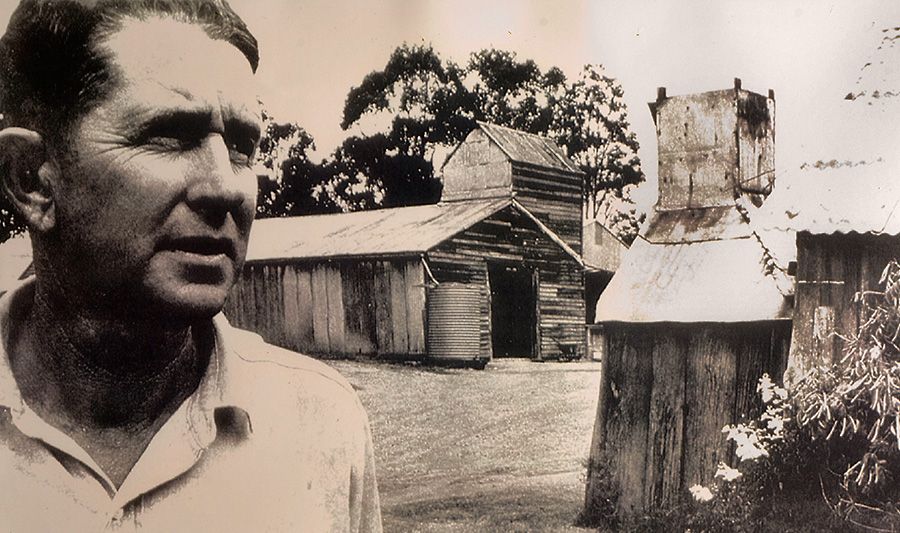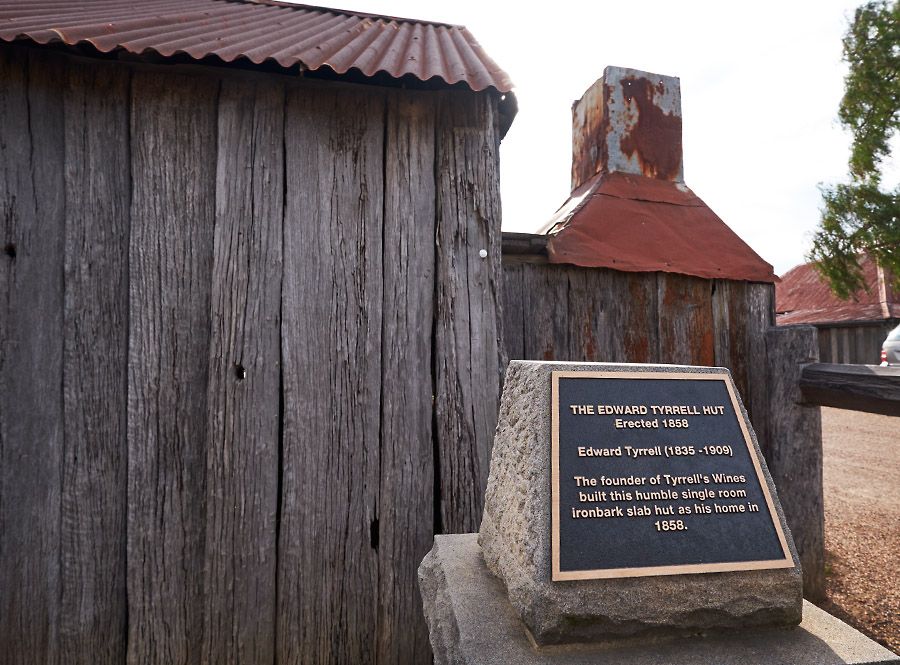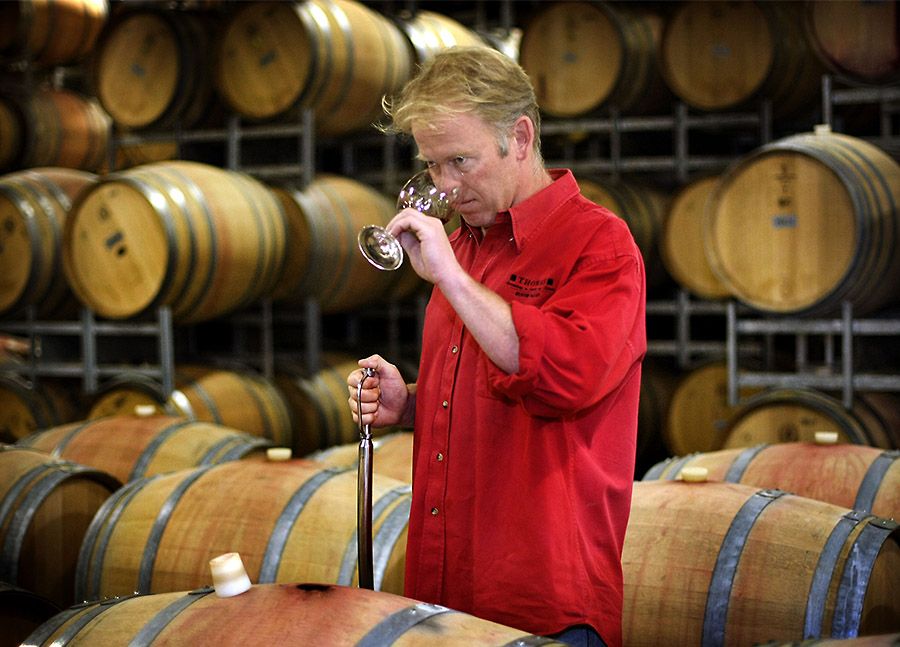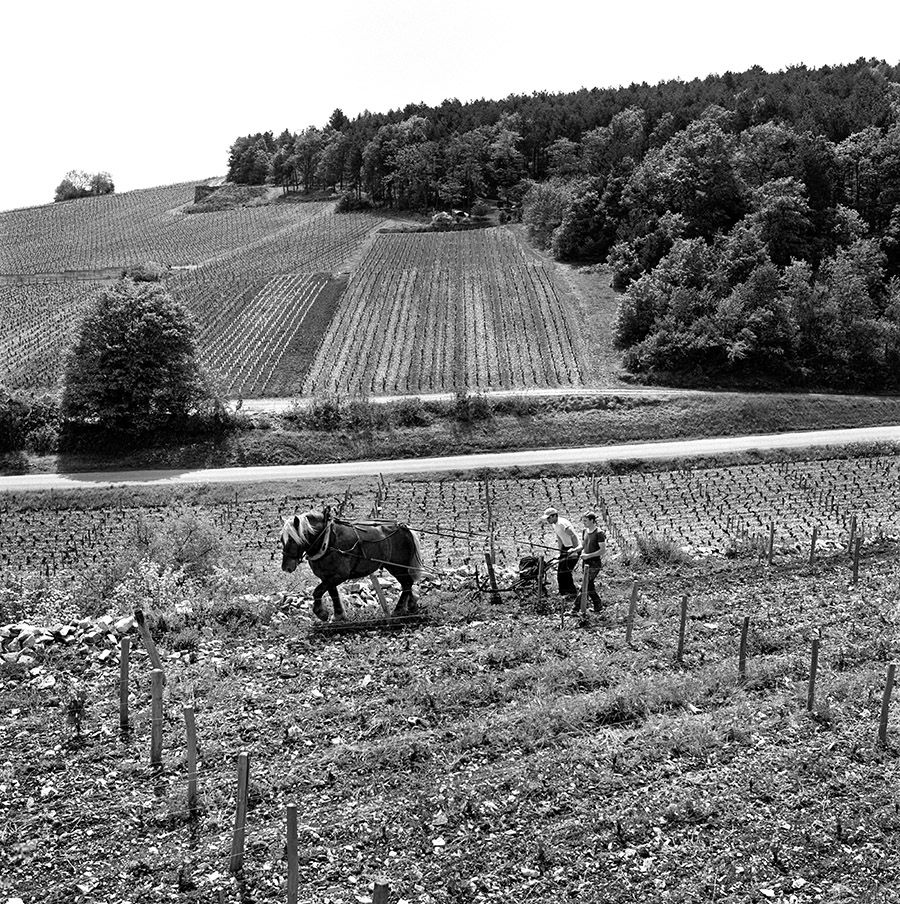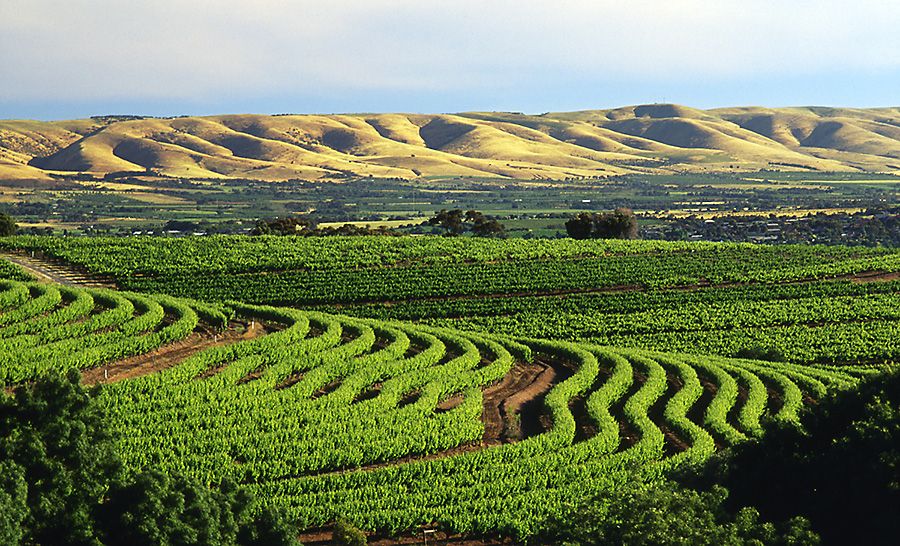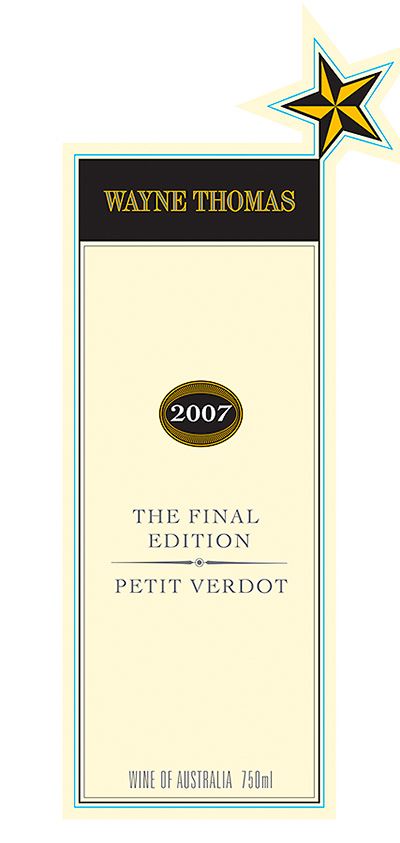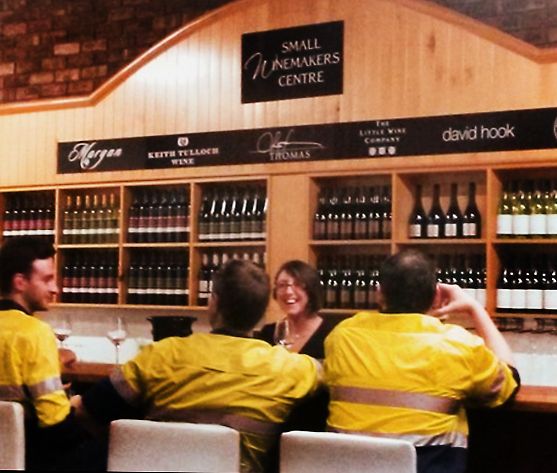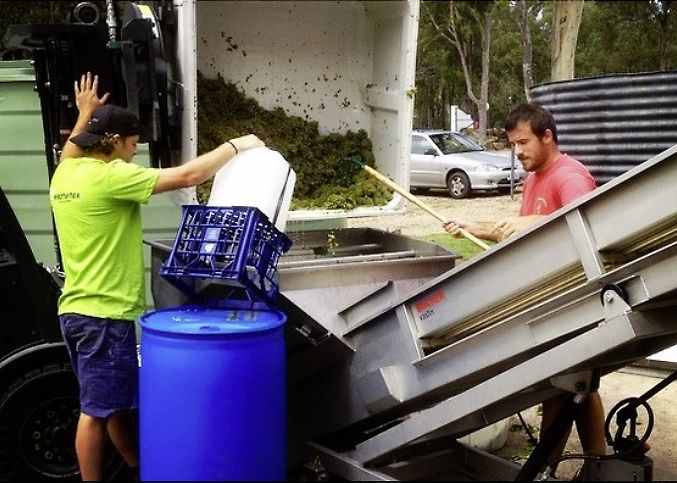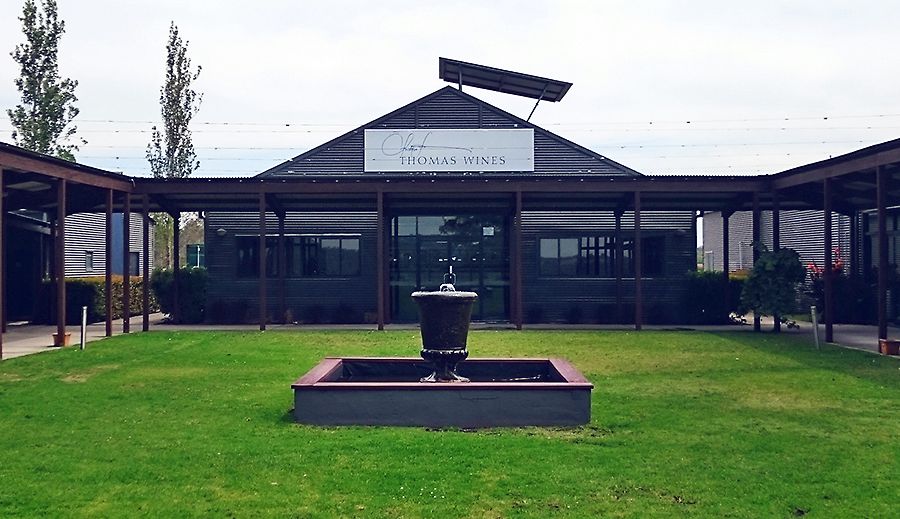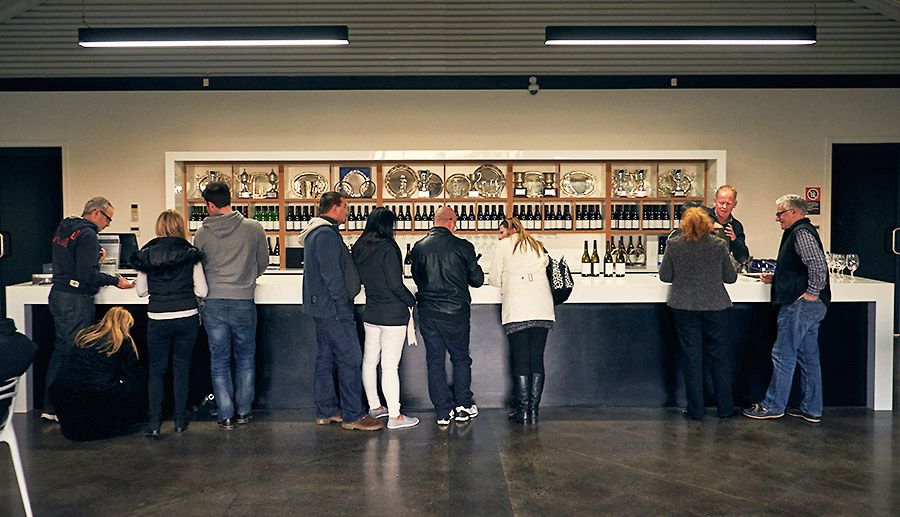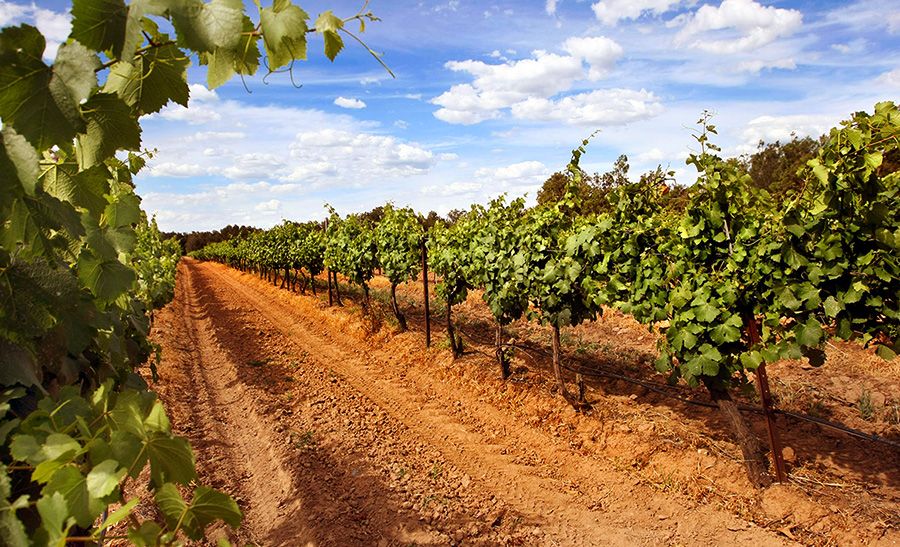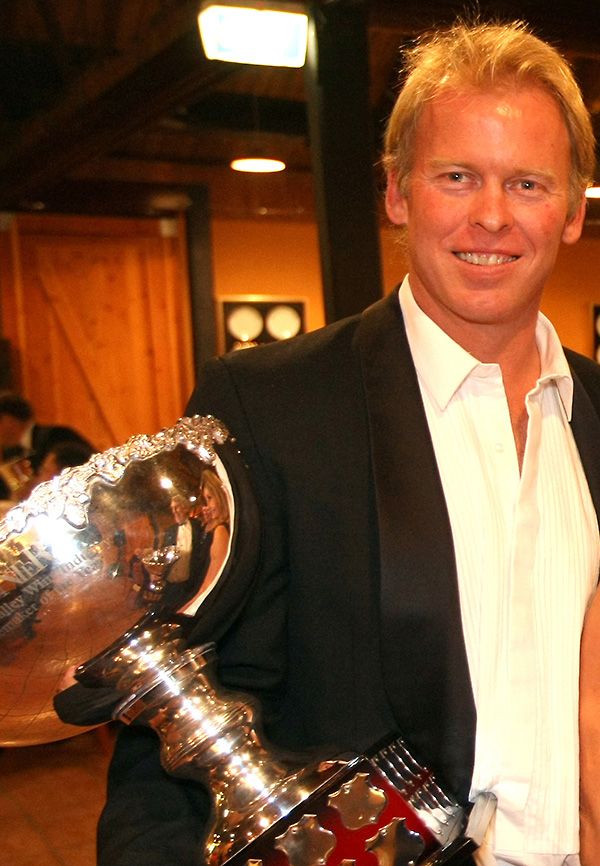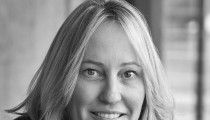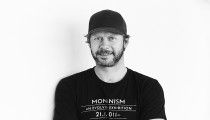Langton has recently launched it’s seventh Classification of Australian Wine.…
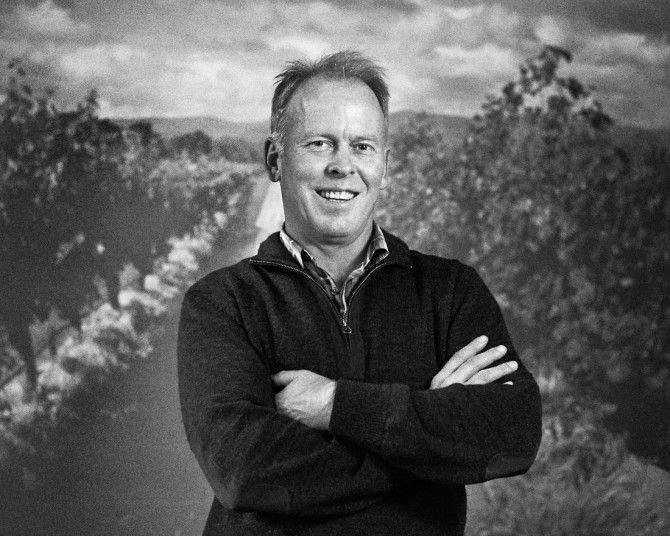
Andrew Thomas : Thomas Wines, Hunter Valley
Andrew Thomas grew up in McLaren Vale but has been making wine in the Hunter Valley for 30 years.
I remember being a young press photographer working on The Australian in Sydney in the early 70’s and thinking, the only red wine was big full bodied McLaren Vale or Barossa Shiraz. The Hunter was just up the road, but the reds just didn’t really interest me.
Seems Andrew and his father Wayne Thomas had similar ideas on Hunter reds around the same time. Things have changed and I now enjoy and regularly buy Hunter shiraz and semillon.
Andrew’s journey is an interesting one. Here’s his story.
You grew up in Mclaren Vale, why the Hunter ?
It wasn’t planned.
In the final year at Roseworthy you are required to go out and do a vintage for work experience as part of the curriculum. I actually did two vintages that year – it was 1986. I did one with a good friend of my father’s John Cassegrain up in the Hastings Valley near Port Macquarie.
Vintage there is much earlier than South Australia, so I did a few weeks up there and then headed back and did a vintage with Doug Lehmann at Basedows in the Barossa.
While I was up with Cassie at Port Macquarie we had some challenging weather come through. John was one of the previous winemakers down at Tyrrells and was still very close with the Tyrrell family.
The weather was so bad that Murray Tyrrell hit the panic button and wanted to get a whole lot of fruit off in a hell of a hurry.
He just happened to be talking to John and asked if he had anyone he could send down for a week just to put a few extra loads of fruit through.
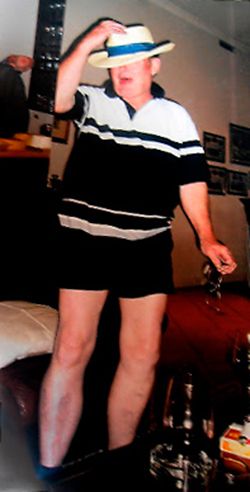
Wayne Thomas. Photo : Philip White : Drinkster.
John said, “Well I’ve got Wayne Thomas’ son up here”.
So down I went. I think one of the things my family instilled in me is that a good work ethic goes a long way.
So I came down here and I worked my absolute arse off – probably way and above the call of duty and I think that impressed the Tyrrell family.
Later in that year when I was back at Roseworthy – someone had left Tyrrells, they rang and offered me the job as an assistant winemaker – aka glorified cellar hand, but it was a great way to start, and I’m glad I had the opportunity to work from the cellar floor up.
Having grown up in the wine industry, I was well aware that there were too many people who were put into positions of responsibility without really having that cellar floor experience.
So I thought it would be a great start to my career.
I didn’t really know much about the Hunter, and to be honest with you, being a typical South Australian I think it’s part of your DNA to have a sort of disdain or disrespect for the Hunter.
I arrived here in January 1987 just ahead of the vintage starting.
You must have grown to like it, you have been here 30 years.
When I came here, I thought, Tyrrells are a very well respected company it would be great experience.
I didn’t really have any long term plans. Honestly I thought maybe in 2 or 3 years I would probably migrate back to SA. That just never happened.
I worked my way up to a position of responsibility – in charge of all their red wine production and ended up staying at Tyrrells for 13 years.
I left at the end of 99.
In the last few years at Tyrrells I got my confidence and got my head around what makes the Hunter tick in terms of our unique wine styles.
Don’t get me wrong I didn’t know it all then and even after 30 years down the track I’m still learning as all winemakers do. The good thing for the Hunter is, we are all just constantly trying to get our message out there.
Regions go in and out of favour — there are trends and fads… and unfortunately for the Hunter there was a period where everyone was sick of it.
The wines were not up to scratch – we all understand that. We as a region through our Wine Industry Association made a commitment to clean up our act. The main issue a while ago was Brettanomyces (Brett) and sloppy wine making.
There was a real focus within the region about 10 years ago that was all about education; explaining to people what was going wrong and what they had to do to improve it.
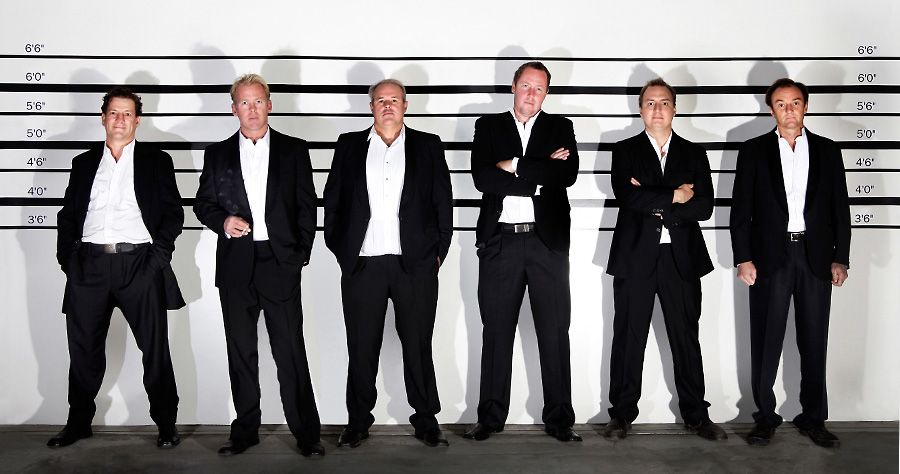
Hunter Valley, the next generation. L-R David Hook, Andrew Thomas, Rhys Eather, Nick Paterson, Michael De Luliis and Andrew Margan. Photo Chris © Elfes.
It was about evidence – testing their wines rather than putting their head in the sand. It actually didn’t take too long- a couple of years, before the serious producers in the Hunter Valley have gone from producing ‘Bretty’ wines. I was touched up with Brett as well and it was a hell of a shock to me – I didn’t understand it, but as soon as I found out – I thought we’ve got to deal with this.
The wines weren’t riddled with Brett but they were touched with the stuff. I had a concerted effort even within my own business to fix it up and we went from having potentially a bad problem to ridding ourselves of it.
Now we see Hunter reds with a real fruit purity and vibrancy, but retaining that regional savoury texture and medium weight structure.
My best mates are actually my competitors, there is that great level of camaraderie – I think part of that is just the Aussie knockabout thing – you know, help a mate out.
If a piece of my equipment breaks down I can just make a phone call and the problem is sorted straight away. That has always existed in the wine industry and it still exists today.
I think some regions are probably a bit closer than others – that’s one of the things I love about the Hunter – it really is quite a close community
What was it about the Hunter ?
We were talking about that inbuilt SA gene that thinks that the only decent wine is South Australian. I remember my folks talking about it saying that Hunter shiraz was weak and pissy because it wasn’t full bodied.
Obviously going through Roseworthy I wanted to expand my horizons a little bit.
When I got here in 1987 I knew nothing about Hunter semillon or shiraz for that matter and didn’t have much respect for it. I think I was very fortunate to be nurtured and mentored by such a proud and historic family company as Tyrrells.
Murray Tyrell as the mouth of the Hunter was stoically Hunter – he basically gave South Australians back just as much as South Australians gave him. He showed me and all of the other interested winemakers and staff that worked for them about what the Hunter could offer.
We used to go and eat out regularly and he had a passion for Burgundy.
He taught me about Burgundy and there is that connection between Burgundy and pinot and Hunter River Burgundy.
It doesn’t need to be full bodied – it can be light or medium weight but if it has beautiful internal structure, that’s what is important – that’s what gives wine longevity, it’s not alcohol or extract. It is all about complexity, balance and internal structure.
I think once I got my head around that I really started to appreciate what Hunter shiraz is all about – it’s not about weight – it’s about beauty.
I started to understand that and once you start getting your head around something that not many people understand, it gets you hooked.
I didn’t have a turning point – but it just kept me here longer because I wanted to understand more about the unique styles of these region.
I married a local girl in 1994 and I’m still here. At that stage I think I had reconciled in my own mind that the Hunter was where I wanted to be. We’re no longer together but we’ve got three great boys – one of them thankfully is a very passionate Aussie Rules player, the other two play Rugby union – which is OK because I think Union is much better than League.
The first thing I did when I got here actually was to go through the Yellow Pages looking for who ran the local AFL football region. I rang them and said I’m from South Australia – which is my local club – they pointed me in the direction of Singleton.
I played footy up here for a long time – probably 15 years before I decided it was retiring time – you know – I had kids .. a business – and wasn’t quite as quick as I used to be ….
When did you get the wine bug ?
I didn’t really turn to wine until I was in my last couple of years at high school.
To be honest growing up I didn’t have much interest in the winery – it was just there – you grew up with it… I’ve got kids now and I pick them up from the bus stop and when I don’t have the dog in the car they say – “Oh so we have to go back to the winery … Do we have to…” Its boring for them – they would rather be home kicking the footy around or playing X box and it was no different for me.
My interest through my early and mid high school years was music and that was where I was kind of heading for a career. It was in my last year at high school – I thought whilst I loved music and was going OK with it, I realised that to make a career of it, I would need to be outstanding and I didn’t think I quite had what it takes, so I reassessed my options and wine making seemed to be an obvious choice.
So I applied for Roseworthy and to be honest you didn’t need to have ‘doctor’ marks to get into winemaking…..
Your father Wayne was a highly regarded McLaren Vale winemaker. What did he teach you ?
I guess work ethic for one, not just in wine, but what you need in any small business …. but more important than that, was that it’s good to be serious about wine without taking wine too seriously.
There are too many wankers out there who want to take it too seriously, want to take it to a level where it rises above your average everyday person and that’s not what wine is about.

Wayne and Bev Thomas after being named the Bushing King and Queen in 2006. Photo by ‘On the Coast’ © Victor Harbor Times.
There are some amazing wines that are out of the reach of most people, that’s fine, but at the end of the day we are not saving lives, we’re making a drink and if more people can enjoy it in moderation the better.
I’m obviously very serious, very passionate about what I do and the wines that I produce.
There’s a very methodical way that I do things but I don’t take the whole wine thing too seriously.
So when you say – what did my dad teach me, the over-arching thing …he was just a knock about bloke who made some seriously awesome booze but at the end of the day, a fag and a beer were just as important …and you know the apple doesn’t fall too far from the tree.
There was never any pressure nor did I have any intention of working with or for Dad, his business was quite small – boutique – same size or smaller than my business now – so there probably wasn’t any room for me there anyway.
When he passed away, you took over the vintage, what was the wine like ?
That was in 2007, the last of the drought years up here – so we had quite an early vintage and McLaren Vale from memory was normal or maybe a bit later. It was clear that Dad was kind of on his way out, so I just made my priorities – once I had finished what I need to do here – I spent as much time there as I could in McLaren Vale.
I would go down, drive him around to visit his growers and have a look at the fruit. That was March 2007 and he passed away not long after the harvest. He didn’t really leave his affairs in terribly good order.
That was his last vintage so my priority was to look after his suppliers and make the best wine I could. My growers are the most important suppliers to me and Dad operated the same way, he taught me that as well. He didn’t own any vineyards so he relied on his awesome growers.
You’ve got to make sure those guys are looked after – not only in terms of price but by making sure they get paid on time – cause everyone’s got to put bread and milk on the table.
I just decided it was in everyone’s interest if I paid the growers and then I shipped all the brand new wine, not long after first ferment, up to the Hunter to finish it off. I bottled it in 2008 and labelled it basically as his label – Wayne Thomas wines with the star in the corner – but as the Final Edition .
It was probably a little different wine than he might have made. I put it into my own oak… Hunter shiraz is much more suited to French oak than American. He would have had a higher proportion of American oak. There was good demand and I sold it all within the first couple of years – but I have kept a little bit for special occasions.
It’s the 10 year anniversary next year of Dad passing away – that is probably why I kept a little bit of it.
Do I love the wine? Yes I do. Do I think it’s amazing ? No, but it’s a very special wine to me.
I think as far as Dad goes, one of the most encouraging things for me was – he didn’t have any expectations of me
A : getting into the industry or
B : ever coming back to help out or take over or that sort of thing.
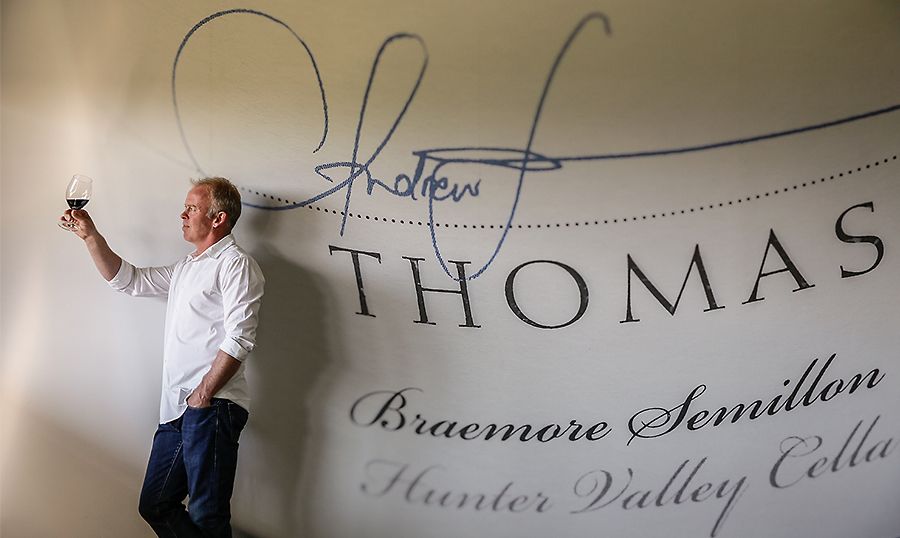
Andrew Thomas. Photo : Chris © Elfes.
From what I could ascertain he was really happy and proud of the fact that I had found my home in the Hunter Valley.
Certainly when I started my own brand he was spruiking it and thought it was a fantastic thing – he was my biggest supporter. I guess he saw a little bit of himself when he started out at Fern Hill estate in the mid 70s.
A lot of people said to me, “Why wouldn’t you keep the label going ?” To be honest, it’s hard enough doing one brand well, let alone two – you’ve got to be at the coal face.
How important was it to travel and look at the world of wine ?
The wonderful thing about the wine industry is that you can travel – because wine is made everywhere, there is something for you pretty well everywhere you go.
As a youngster I had a travel bug and you could tie that in to the profession, so it killed two birds with one stone. My first experience was in Sonoma in the late 80s.
I went to Italy next – in fact the Italy trip was sponsored by Tyrrells.
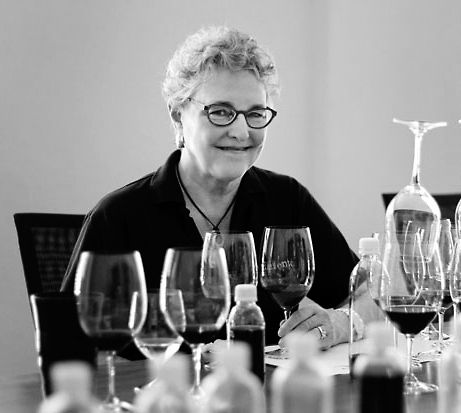
Zelma Long. Photo : Napa Valley Register
We had one of the up and coming winemakers from Antinori spend a vintage with us at Tyrrells and this was kind of like a return trip.
The third time, I basically took leave from Tyrrells and went over and did the flying winemaker thing for a UK negotiant.
I made a heap of rose and some red wine in the South of France in Provence.
It was probably my first trip to Sonoma when I was in my early 20’s that left a lasting impression even though I was probably a bit young/immature or not quite focused enough to take stuff out of the trip from a wine making point of view.
I just had a great time and doing vintage at Simi Wines with Zelma Long, the chief winemaker there in those days.
At the end of the day over the three trips it opened my eyes and broadened my horizons. When you grow up in the wine industry, whilst you are drinking wine from all over Australia and all over the world, actually going to those places puts things into perspective.
It still happens even now – my partner Kim and I went to Europe last year.
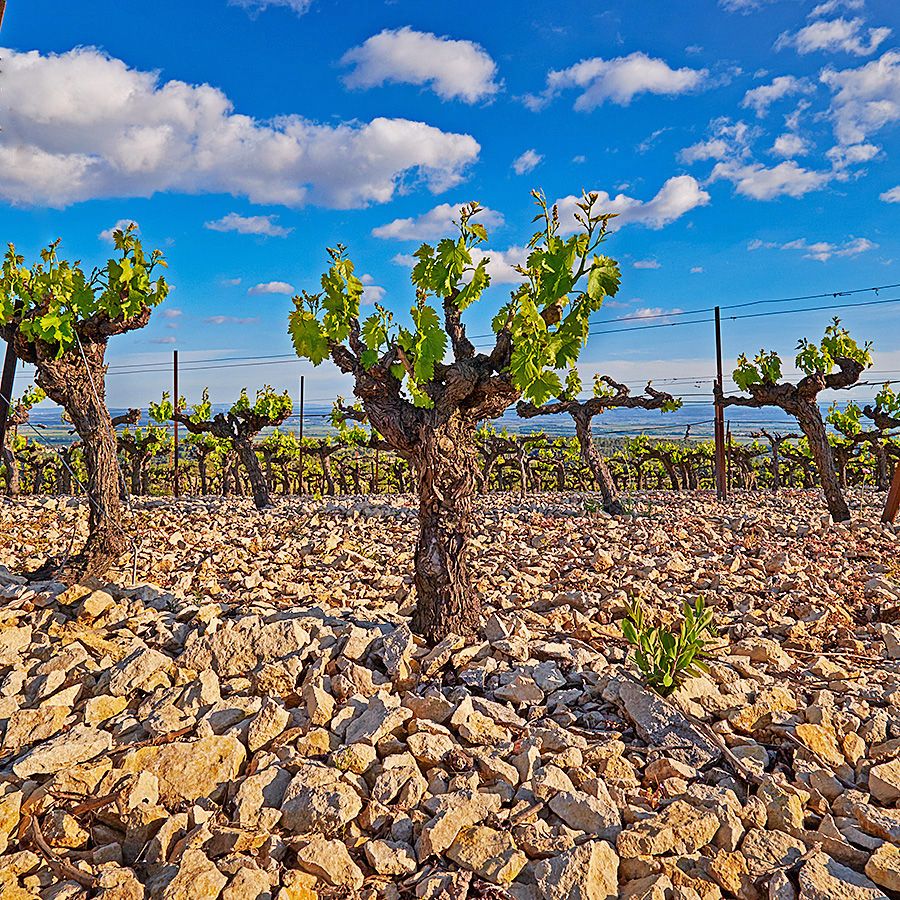
Old ‘Maris Wines’ Grenache in the limestone rocks on a hillside in Languedoc-Rousillon. Photo : Milton©Wordley
I hadn’t been there for twenty years and I was really looking forward to it.
You kind of forget what these regions are like but then when you get there and you see the vineyards and the different soil profiles, it’s like “Ahhh Yes, that is right – this is why these wines are as they are – I can see it in front of me.”
You can read books and you can study maps all you like – but when you are actually there drinking the wines of the region it puts things right in perspective.
What do those trips provide, apart from the enjoyment of travelling – they give something of a worldly view.
Great wines from great regions around the world are great because of X Y and Z. You can’t really fully understand that unless you go there and see it, feel it and taste it for yourself.
Last year we had this refurb in the winery going on, my partner was pregnant – so we ended up just going to Rhone, Burgundy and Chablis, for just two weeks.
Chablis is one of my absolute favorites I have loved it for such a long time, everyone goes to Burgundy but not many go to Chablis and I’m so glad we did – it was just beautiful.
You started your own label nearly 20 years ago, how was that ?
I actually started in the last couple of years at Tyrrells.
One day I happened to find Bruce and Murray Tyrell in the same office and I built up the courage to ask them for their permission.
I can’t say they were ecstatic about the idea but they said “Okay go for your life – but you can’t do it here at the Tyrrells winery…and don’t forget where your priorities are”.
And I absolutely respected that… so my first vintage of my own brand was 1997…it was tiny production – you know 150- 200 dozen.
I ended up for the first few years making my wines in a mate’s winery.
I sold them through a business here in the Hunter called the ‘Small Winemakers Centre’ – it’s in the middle of the Hunter so it’s a good location and as the name suggests they represent 7 – 8 brands under the same roof.
A few local restaurants picked them up as well so that’s where I started.
With the experience you’ve got now and the time would you do anything different ?
My short answer would be probably not – and the caveat to that would be the reason why I’ve done it the way I have is that I didn’t have any money.
I basically started this business by setting aside a small amount of my salary from Tyrrells for the business.
Murray Tyrrell was a very good bloke – an eclectic man, very old school but he had this sixth sense.
He said a lot of things in my thirteen years at Tyrells that stick in my mind.
One thing … and don’t ask me why this thing sticks in my mind, …but he said
“Thommo if ever you go out in business on your own – don’t take on any fucking partners – just fuckin’ do it yourself – do it yourself or don’t do it at all – there will always be a shit fight – there will be an argument and it will end up in tears”.
Now that I’ve been in business a long time, I’ve seen that happen all the time….so that thing stuck in my head and from the very start I was determined to do it alone.
I wasn’t therefore in any position to take on any partners to get some equity in the business and to go and buy vineyards or a winery.
As a result when I first started, the business was tiny – it was infantile, and the growth has been quite organic. I haven’t had a whole heap of funds to put into PR – even if I wanted to.
I have no desire to win a business award for massive growth.
I’m here for the long term.
The whole thing grew organically. If you’ve got the time and the patience – that is actually the best way for a business to grow.
Not you telling people how good your booze is, but having them tell their friends and just having that slow organic growth through that.
I’m pretty happy with my initial plan. It’s still rolling out – it’s not easy – nor am I in any hurry.
I have no desire to be a multi-millionaire.
My desire is to,
A : make good booze that I’m proud of and that a lot of people really like and
B : as a result of that to live a comfortable lifestyle. There are forks and turns and all that along the road and new milestones.
This new cellar door is the latest change in my business and it’s awesome.
I should’ve done it years ago.
I love talking to people who come in to look at our wines. I’m not a bullshit artist. There’s no need to be, people love it when they are talking to the actual winemaker. I do at least one day a week here and I quite enjoy it.
Don’t get me wrong I couldn’t do this every day of the week, it takes a special person to want to do that, and I’m blessed to have a small group of awesome staff.
You get all sorts here and we don’t treat anyone differently.
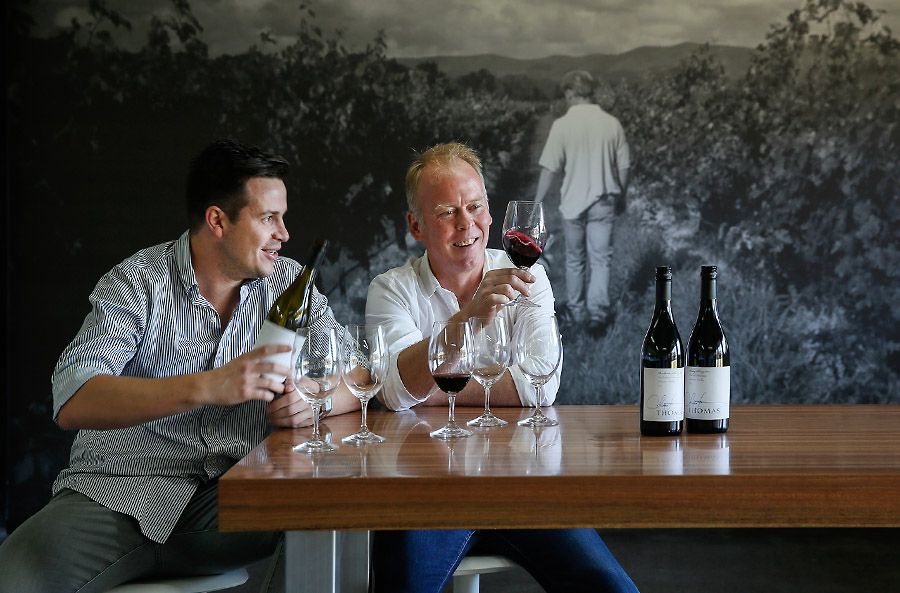
Andrew and his cellar door manager Peter Edwards. Photo : Chris © Elfes.
Obviously if there is someone who has some real interest and real knowledge we might give them more detail – but everyone gets treated the same.
My direct customer list has built up over the years, but because I haven’t had my own cellar door I know all the names but I’ve only probably met 10 % of them.
I met a few of my long term members today. They’ve been buying my wine for years, and it’s awesome just to meet them.
I don’t have to give them so much of the specializing in semillon and shiraz thing because they get it – that is why they’ve been buying over the years. Without a cellar door destination I’ve never had a traditional wine club – you know where you sign up and I send you wines on a regular basis.
Our original list is more the people who have discovered Thomas wines.
We’re so small, the beauty is that people love it when they make their own little discovery.
They come on our list because they are regular buyers so it’s more like a loyalty club than a ‘commitment’. Now we’ve got that destination we’ve started a more traditional wine club.
The sign ups have been amazing… I’ve got a fistful of them just from today.
Vineyards, growers and winemakers ?
To be honest with you whilst I have a very good understanding of what happens in each of the vineyards that I deal with I don’t really meddle in their everyday management. The reason why I deal with these guys is that a) they’ve got an awesome site and b) they know what they are doing… so I really don’t need to teach these guys how to suck eggs.
Obviously when we get into the growing season from veraison to harvest I’m a lot more involved, probably 50% of time in the vineyard and 50% of time in the winery… but I don’t have to tell Ken Bray how to prune the ‘Braemore’ vineyard because he’s been doing it for 30 years.
Quite a few years ago – winemakers were like gods, now the vineyard is so important.
About 5 years ago the industry realised that the whole Brand Australia thing was a bit too generic and industrial.
There was a refocus on regions because the rest of the world didn’t know much about Australia and its diversity – it’s a massive re-education process.
We have still got so much more to educate the world about – but now our major markets understand that regionality is important…. warm climates , cool climates – varieties for different regions.
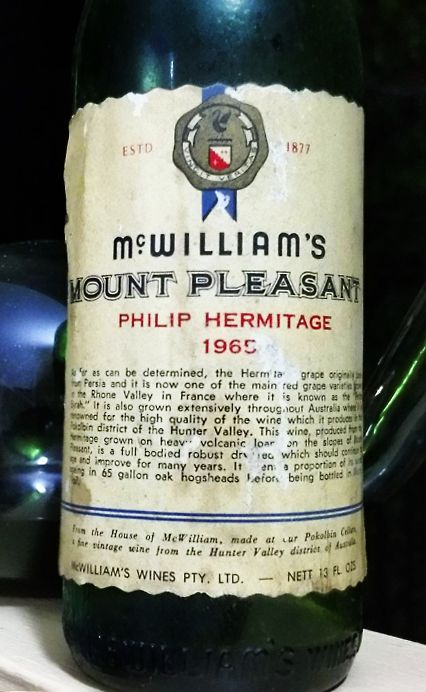
McWilliams 1965 Mount Pleasant ‘Philip Hermitage. Photo © The Wine Wankers.
The region and the vineyard has become much more important.
Memorable wines ?
We spoke earlier of La Tache – the 78 is a pretty special wine.
A little closer to home one of the wines I remember in my formative years as a wine judge was when the 1970 Lindemans Hunter River Chablis, it got a gold medal at just about every single show – it was ridiculous really, but man what a wine.
Haven’t tried it for years, but if you get a bottle which has been stored well and the cork has held together – it’s amazing. Hunter shiraz – I’ve just released my 14 reds in May and 2014 is widely regarded as one of the best vintages in a very long time – the obvious comparisons with the legendary 1965 vintage are being made.
I was just a twinkle in my old man’s eye in 1965 but I would have loved to see those wines at the same age as my 14’s are now.
I think they are probably slightly different, I think those were a little riper and a little more chunky – whereas the 14 are ripe but they’re silky.
I’ve drunk lots of 65’s over the years – and again the Lindemans wines were very special.
I was kind of weaned off the breast onto the big juicy McLaren Vale style – and I love that – but to be honest with you I haven’t drunk a lot of McLaren Vale recently.
One of my favourite producers in McLaren Vale was Coriole – the Lloyd Reserve is one of my favourites’ – it’s distinctively McLaren Vale without being too opulent.
Anything else you’d like to say ?
I hate making comparisons but it’s like Aussie shiraz is like this plump thing and Hunter shiraz is more savoury and more European in texture – it’s awesome and the wines these days have got these great things about the Hunter and purity – great fruit without the distraction of the sweaty saddle and all those barnyard characters.
I just did my 30th consecutive vintage here this year – and it’s gone like that – more than half my life.
The wine industry is unique because you have been in something for 30 years and you’ve only made 30 things – you only get one vintage a year…it takes a long time.
I kinda still feel like a youngster – that’s not such a bad thing – I’m learning every year – I don’t think that would matter who you are or where you are… it keeps you young.
It’s a really exciting time to be a winemaker in the Hunter because we’re back and the wine quality across the whole region has never been better – we’ve just got to let people know….
ENDS.
Production, interview & photography : Milton Wordley
Transcript & edit : Anne Marie Shin
Website guru : Simon Perrin DUOGRAFIK










